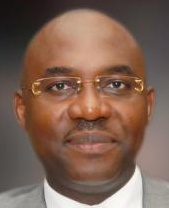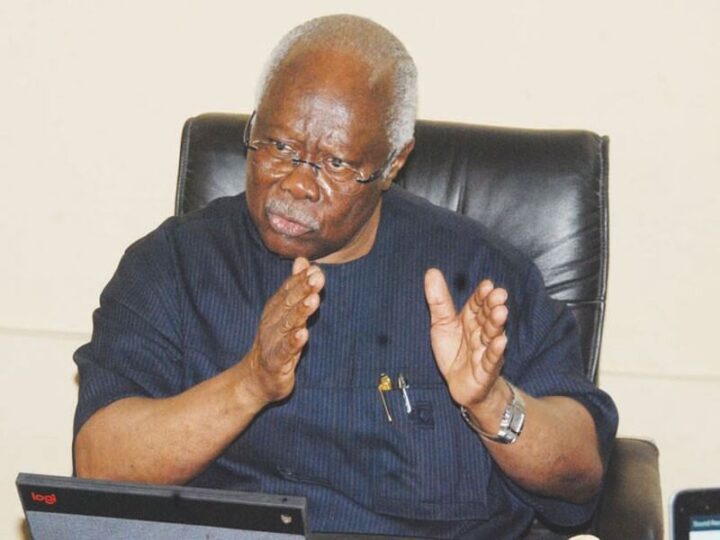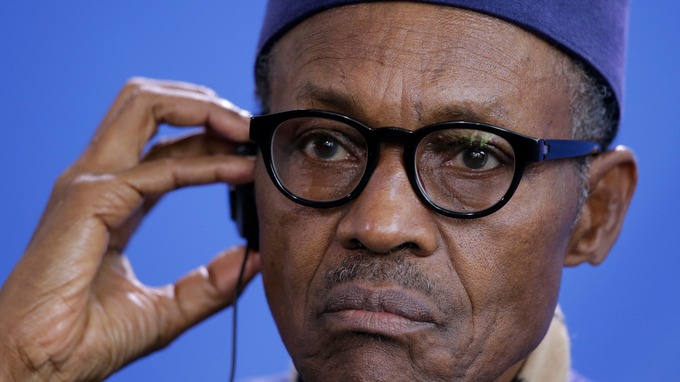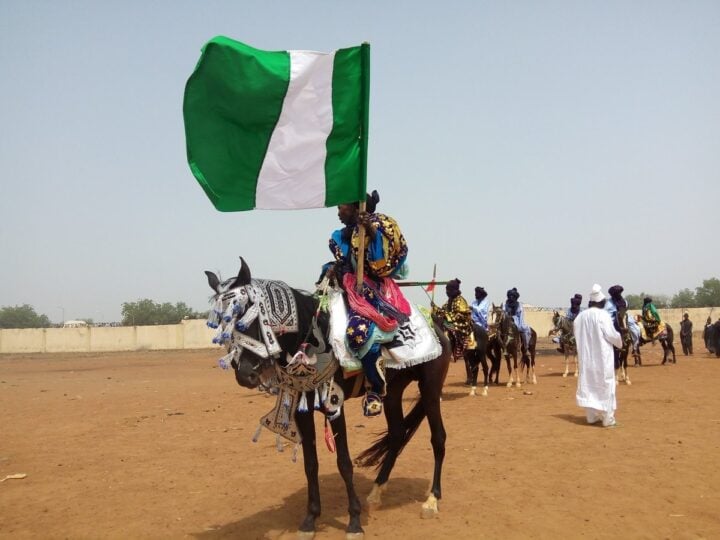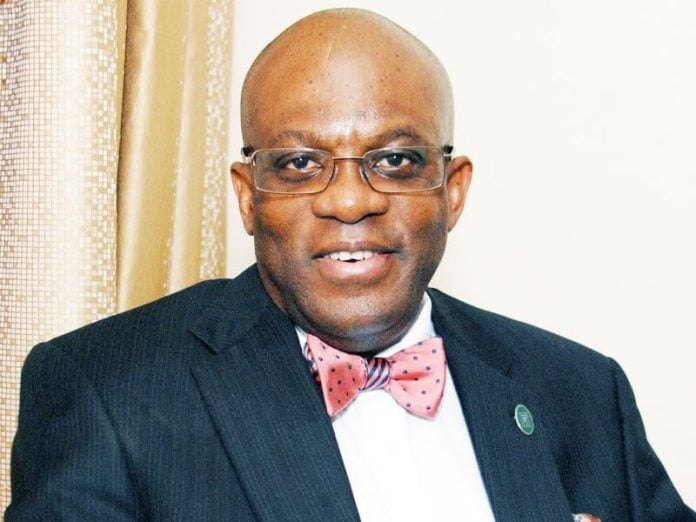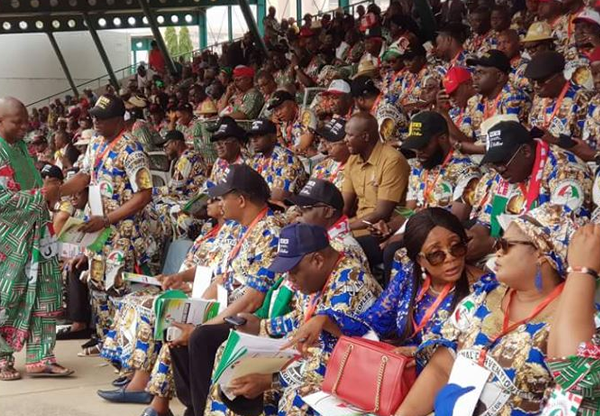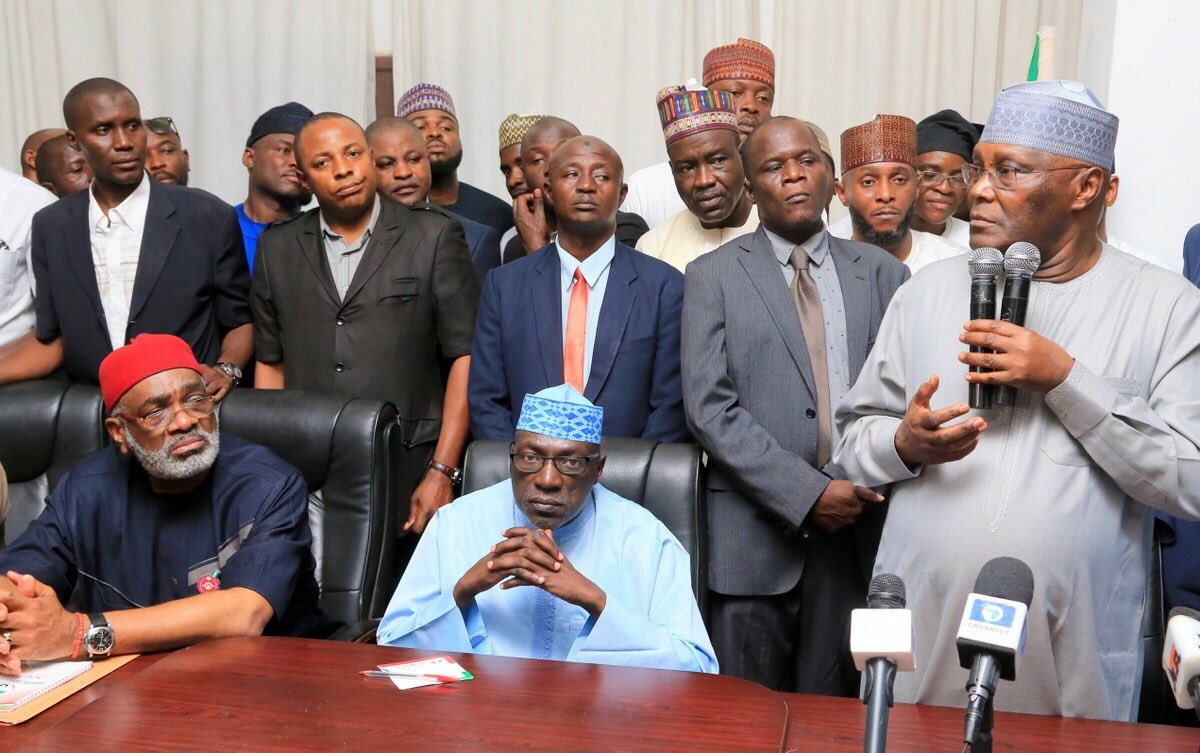Bode George
Part of the paradox of human nature is that those who made a career of putting others to death by the sword always become uneasy themselves at the sight of same weapon in the hand of a stranger.
Such would seem the case of Bode George, erstwhile supremo of Peoples Democratic Party, whose dream of becoming national chair of the party evaporated like smoke last weekend.
How ironic that BG, a retired Commodore, who was never shy to adapt martial language in describing how political opponents would be crushed, ended up not being able to even throw a single punch this time in what could be classified the most important battle of his entire political career. Without the veto of gun and bayonet, the old naval warrior looked so ordinary in the civil contest.
Rather, after withdrawing from the race on the convention’s eve, he lapsed into a grumpy mode. In his bitter tirade, he lamented the influence of money in the race. He took liberty to introduce himself as a long-standing apostle of righteousness. So, the “Atona (pathfinder) of Odualand” should not be expected to soil his nobility with the carnality of buying and selling delegates at the bazaar called convention.
Advertisement
Ha!
Silence would have been most dignifying after BG threw in the towel. To begin with, who does not know that delegate election is euphemism for discreet “buying and selling” of votes?
The bitter truth is that the highest bidder often carries the trophy. Even in the so-called advanced democracies, the inducement is only fancifully packaged as “free lodging”, “free transportation” etc bankrolled by contestants. Such unwholesome tales were heard even in the United States last year during the conventions by the Democrats and the Republicans. Having evolved with PDP right from 1998 as he rightly claimed, BG is certainly the least morally competent today to decry money politics in Nigeria.
Advertisement
If now outgunned or outspent by the young Turks, the least expected of a supposedly self-respecting dinosaur like him is concede victory, in obeisance of the unwritten oath of the political underworld that once benefited him. At 72, clearly there are few political options left for the old mariner.
Worse, BG indulged in another vulgarity peculiar to the typical Nigerian politician upon losing their stake in the power casino – retreating into the ethnic hideout. He equated his inability to clinch the PDP crown to Yoruba humiliation. For effects, he launched into needless self-praise, reminding everyone of not only his “Atona” chieftaincy but also the Yoruba definition of “Omoluabi” (the virtuous citizen).
But such obscenity of self-adulation would have been forgivable were it backed with proven testimonial of political virility at home. In the last eighteen years of elections and democracy in Nigeria, never has BG won his polling unit at Evans street near the iconic Massey Hospital in Lagos island. Not even once. Not even when his political lord and master, OBJ, twice deployed “federal might” against Lagos in 2003 and 2007 in furtherance of “operation totality”.
So, to what do we attribute this obsessive bragging?
Advertisement
Oyebode @ 70: Treaty-master and a nation at the nadir
There are a few telltale signs that a nation has lost her own dignity and prestige on the world stage. Perhaps, the most easily recognizable is the weight her passport carries at a foreign border post and how her citizens are treated on a foreign soil, particularly when at fault.
True, Nigeria’s stock on the global stage has been in decline over the years. But even at that, nothing could have prepared anyone for the sheer evisceration, the diminution of the Nigerian humanity as depicted by the plethora of horror videos emanating lately from Libya’s open slave market and the adjoining transit camps of desperate immigrants from sub-Saharan Africa longing for Europe.
For the young women, graduating from Libya’s torture chambers and rape bouts is however not a guarantee that they would survive the perilous sail on the Mediterranean Sea. Two out of 26 bodies of such ladies recently discovered refrigerated in a dark vessel off Italian coast were identified as Nigerians. They were found to be pregnant.
Advertisement
Worse, in what only suggested absolute contempt for the Nigerian state, their remains were hurriedly interred by the Italian authorities without according the bereaved families even the least entitlement in the difficult circumstance – the opportunity to pay the customary last respects. We see the vanishing Nigerian pride also in the waves of unprovoked and later unchallenged xenophobic attacks against her citizens in South Africa.
Nigeria’s steep fall from the height of respectability of the 70s in both regional and international arenas could only have resulted from the cumulative failure of diplomacy in the intervening decades.
Advertisement
This must indeed be a troubling moment for Akin Oyebode, professor of International Law and Jurisprudence and one of Nigeria’s truly progressive scholars who turned 70 last Saturday. The celebration of this icon has animated the progressive boulevard of the nation’s academic community in the past few days.
Were he asked to contextualize the referenced indignities suffered by Nigerian migrants today, the Ekiti-born scholar would likely put it all down in his accustomed wit to Nigeria’s loss of her “nuisance value” in the global arena. If the 1970s are still remembered today as the golden age of Nigeria’s diplomacy, it is only because of the character and coherence demonstrated by the political leadership of the era.
Advertisement
Over the weekend, President Muhammadu Buhari led the stream of stirring tributes for the erudite professor attaining the platinum age. Indeed, not many could be said to be as consistent as the Ekiti-born scholar in the past half century in exploring the far reaches of International Law through research, writing and propagation to fashioning the African perspective to world diplomacy.
Central to this Pan-Africanist standpoint is the fierce reminder that Nigeria and indeed all self-respecting post-colonial states must define their own truths and realities from their own interests, not the dictations from the western powers. It is, therefore, impossible to read and digest his “International Law and Politics: An African Perspective” and not feel the awesome presence of a truly authentic African thinker.
On a personal note, this writer had the privilege of being taught International Law by Professor Oyebode (doubling as the HOD of the Law Faculty) at the University of Lagos for his Master’s degree in International Law and Diplomacy many years ago. A true master of his art, his erudition always electrified the packed lecture hall, spiced with a terrific sense of humor that made arcane technical concepts looked so simple and otherwise mundane events of history truly memorable.
Advertisement
However, the simplicity of his airs sharply contrasts the rigidity of his principle. Once the Vice Chancellor of Ekiti State University, he did not hesitate before tendering his resignation letter once he sensed his values conflicted with those of the new political leadership of the state then.
Overall, there can be no doubt about the surfeit of professed solutions to African problems. But the enduring question is whether the errant nation, the wayward continent, is willing to heed the wise counsel of the philosophers like Oyebode.
In a paper he delivered back in 1986, he observed: “The fact of underdevelopment of Nigeria’s political economy circumscribes the role of the country on the world stage. The sophistry of Africa being the centerpiece of our foreign policy has worn thin. Without genuinely radical reordering of our society, the country would be unable to fulfill its mission in Africa and beyond.”
Thirty-one years later, those words surely continue to speak to the Nigerian reality. That the allure of migration now seems too irresistible to our youths to the point of embarking on suicidal trips through Libya is only a reflection of harsh economic climate at home. It is the immutable law of nature for man to lust after greener pasture. When opportunities abounded at home and Naira was strong, the temptation for our ladies to go prostitute in Italy and young men flocking to labour camps elsewhere in Europe to slave was certainly less.
It is perhaps a measure of the insipidity of our contemporary foreign policy that a nation that birthed the Emeka Anyaokus, Bolaji Akinyemis and Oyebodes seems no longer capable of speaking eloquently and respectably on the world stage today.
Oyebode’s possible anguish could then only be in context of the curse of talents left to lie fallow. Nothing could truly be more traumatizing than the spectacle of a land brimming with great minds being sentenced to a darkness and squalor inflicted by mediocrity or the scion of the proverbial meat-seller left a supper of bones.
Of course, in retrospect, the carnage that Libya approximates today is another graphic illustration of the failure of African diplomacy of which Nigeria cannot, by any stretch of imagination, shirk responsibility. It was largely in the interest of vengeful western powers that erstwhile Libyan strongman, Moammar Ghadaffi, be swept out of power in the ferment of the Arab Spring. But the aftermath only left Africa with more instability.
At the defining moment, the African Union ceded the initiative to buccaneering outsiders and, instead, conveniently chose to marinate in idiocy. It explains why Libya is now a lawless province with no fewer than five militia armies laying claims to different chunk of the once prosperous country. It explains why, even when Nigerians are either sold as slaves or butchered openly, there is no constituted authority to hold accountable today from the perspective of International Law.
Oyebode’s forte in International Law is treaty. From his antecedents, it is safe to also assume Prof has been suffering insomnia not so much for Morocco’s treacherous bid to gatecrash into ECOWAS from North Africa, but more for Nigeria’s apparent timidity, if not indifference, to what should ordinarily be treated as a clear and presence threat to her continued dominance and influence in the West African sub-region.
Regardless, here is wishing Prof happy birthday.
Views expressed by contributors are strictly personal and not of TheCable.
